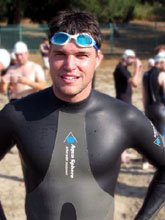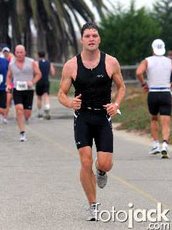There's a little party game that's making the rounds among fitness professionals of late called "What do you know that you can’t you prove?" I'm not sure who started it but it's a pretty interesting little exercise, and a lot of the first-string fitness pros have weighed in with some pretty great ideas (T-Nation.com did a roundtable a few weeks ago).
In my tip from a few weeks ago, "A Little Thing Called Science," I talked about the importance of checking sources on any study that purports to offer objective fitness advice; I also warned readers of the prevalence of junk science in our industry, and basically sounded a note of caveat emptor among consumers of fitness information and products. As ever in our field, there are lots of charlatans out there.
That being said, I've just been named the new face of DELISH-O-DIET® Protein Weight Loss Muscle Gain Sex Drive Make A Million Dollars Snake Oil formula, and quite objectively I think everyone should buy a boatload today! It's GREAT!!
Just kidding, though let it be known I am very much available for endorsements.
Okay, anyway. Despite my healthy skepticism for patently unscientific claims, I do think that there's room for good ol' fashioned, hard-earned, learned-in-the-trenches wisdom that accrues from years in this-- or any -- field. You know how in buddy cop movies there's always the young, by-the-book cop and his wily veteran partner who follows his hunches and does things his way, and by the end of the film the by-the-booker has learned a thing or two about chucking procedure and going on instinct? Well now I'm speaking up for those wily veterans. The cantankerous Burgess Merediths out there who just know what they know, who do what they do cause it works, dammit.
Of whom I can hardly count myself one. Still, here's my j.v. version of the "something I know but can't prove" game:
The earlier in your life you get in shape, the easier it is to maintain or get it back.
I'd like to come up with a compact, rhyming version of that little principle, like, "grow it early, and you'll never look squirrelly," but it's still a work in progress.
Now I'm not just talking about "muscle memory." It's widely accepted that it's easier to rebuild lost fitness than it is to build it from scratch. I'm suggesting something further: that there is a window of time, say, from age 12 though age 20, during which, if you get in shape, you're more likely to remain in shape as you get older, and still more able to recover your former glory should you fall off the exercise wagon at any point thereafter.
Hard to prove, I know: I suppose you could do one of those famous "identical twin" studies where you separate a pair of twins at birth, have Twin #1 participate in a fitness program during adolescence and Twin #2 wait till his thirties to get healthy, let them both go to seed, then put them on identical training programs twenty years later and see who responds the best. It would only take a few thousand sets of identical twins willing to do your bidding for life. If you could persuade any reasonable adults to participate in such a preposterous study, I guess what I'm saying is that I bet Twin #1 would clean up.
[Side note: I wonder if you could make a living being an identical twin? With all the genetic studies out there requiring thousands of sets of them, and the relative dearth of such twins, couldn't you just fleece the NIH every time you get a call if you were an identical twin? Seems like the "Good of Science" argument might only work a few times before you'd ask them to pony up. I'm picturing a Will Ferrell movie where Ferrell repeatedly participates in such studies even though he has no twin. He does dozens of these studies for thousands of dollars. Genetic science is thrown completely off because he skews the results of every study he participates in. Hilarity ensues.]
So what proof can I offer for my theory? Well, there was my childhood friend, Derek Dean, whom I still see on occasion. I met Derek when the two of us were in middle school and we became lifting buddies. The keen eye of my teenaged machismo noticed -- and coveted -- his peaked, rounded biceps, which, he claimed he'd built stacking wood (we went to school in woodsy New Hampshire in the 80's, back when wood stoves were considered eco-friendly). Anyway, I saw Deano again a few months ago, and although he's pretty much given up weight training in favor of attempting to break the four-minute mile, the guy still has those enviable biceps.
I also think about other guys I've known who were athletes in college or high school, who, despite years of inactivity, either still look kind of athletic, or get their muscles back after just a few weeks of concerted effort. I suspect those guys drive their gym-rat girlfriends crazy.
Finally, many other physical functions appear to operate similarly. Preadolescence and adolescence are fertile periods (ha, ha…) for just about every kind growth. Child development experts speak of a window for learning a new language, during which retention and comprehension is high, and the child is less likely to forget lessons learned: fill in that language template early, and it's less apt to get erased. Bone growth happens in a similar manner. Exercise physiologists now recommend judicious use of higher-impact activities for young adults in order to achieve a high rate of bone mass in early adulthood. The theory goes that the higher that peak bone mass is as an adolescent -- when conditions for bone formation are optimal -- the less likely the child will be to develop osteoporosis and other skeletal problems in later life. Here again is the ideal window for optimal development occurring in early adolescence.
I suspect muscle tissue operates in a similar fashion: plant the seeds for muscle memory early in life and you can reap greater benefits later.
Admittedly, my theory is not much good for those of us who waited until later in life to make a real run at getting in shape. Still, the argument stands for getting yourself moving sooner rather than later, even if "sooner" means 75 instead of 85.
Furthermore, it's an argument -- along with the bone-growth theory, which actually has a scientific basis, unlike my little piece of armchair-physiologist hypothesizing -- to get our kids out there and active as early as possible. Better yet, let's go out and play with them. My three year old, Kate, has a new favorite game at the park called "obstacle course" where she and I take turns giving the other complex routes to run: through the swings, up the slide, down the slide, swing from the low bar, around the tree three times... etc. I go all out when it's my turn, and so she does too.
Friday, April 27, 2007
Subscribe to:
Post Comments (Atom)




No comments:
Post a Comment